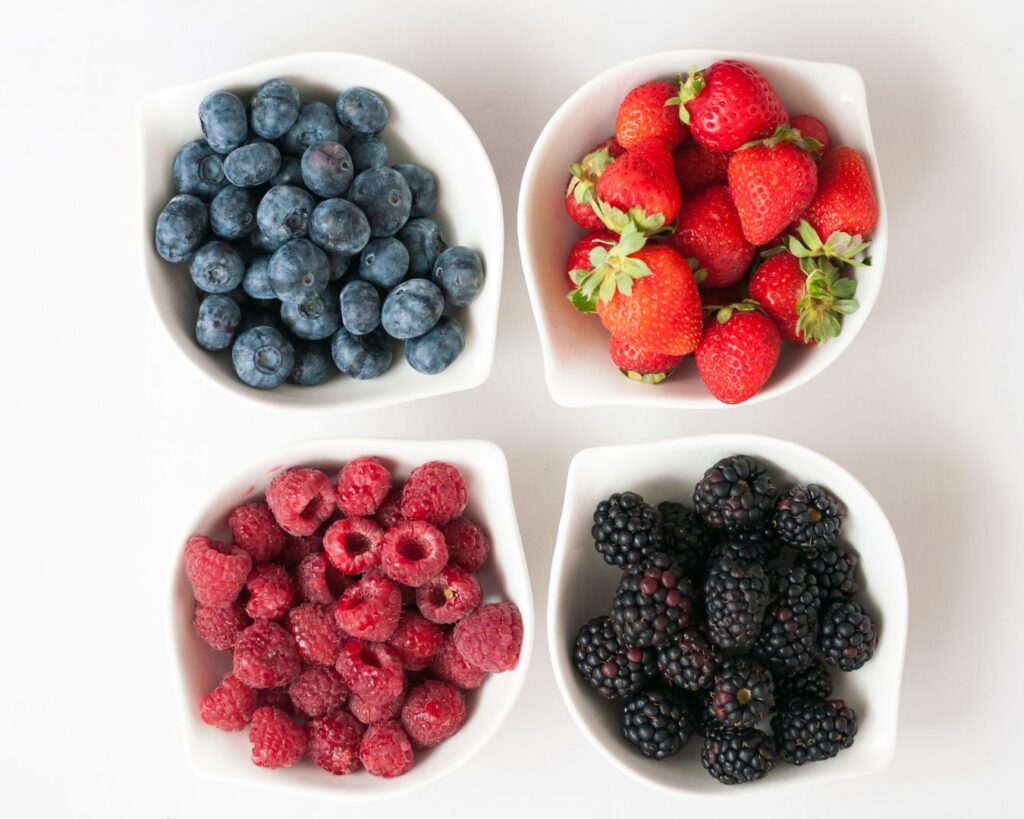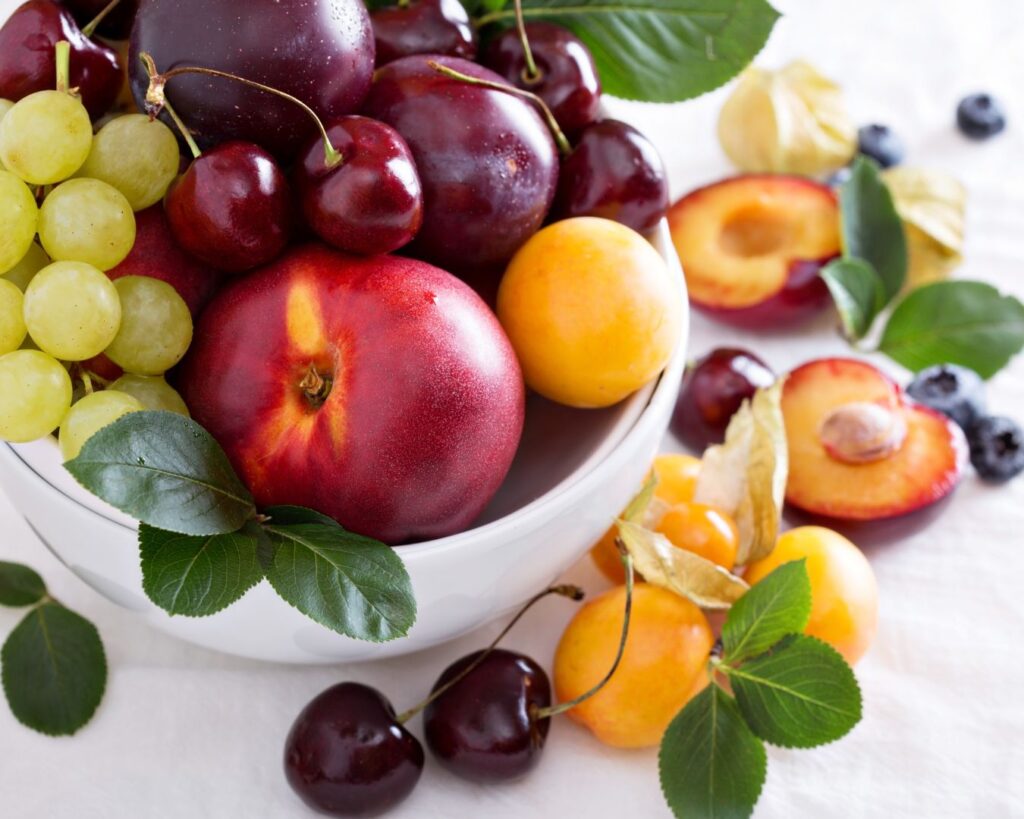The Nutritional Benefits of Different Fruits and Vegetables: A Guide to Healthier Eating
Fruits and vegetables are nature’s powerhouse foods, packed with essential vitamins, minerals, and antioxidants that our bodies need to function optimally. Incorporating a variety of fruits and vegetables into your diet is one of the best ways to ensure you’re getting a broad spectrum of nutrients that support overall health. In this blog post, we’ll explore the nutritional benefits of different fruits and vegetables, highlighting why these foods are essential for a balanced diet.
Leafy Greens: Spinach, Kale, and Swiss Chard
Leafy greens are among the most nutrient-dense foods available, offering a rich supply of vitamins, minerals, and phytonutrients.
- Spinach: Spinach is an excellent source of vitamins A, C, and K, as well as folate, iron, and magnesium. These nutrients support immune function, bone health, and energy production.
- Kale: Known as a superfood, kale is packed with vitamins A, C, and K, along with antioxidants like lutein and zeaxanthin, which are beneficial for eye health.
- Swiss Chard: Swiss chard provides a good amount of vitamins A, C, and K, as well as potassium and magnesium. It also contains betalains, which have anti-inflammatory and detoxifying properties.
Health Tip: Add leafy greens to your salads, smoothies, and stir-fries to boost your intake of these vital nutrients.
Citrus Fruits: Oranges, Lemons, and Grapefruits
Citrus fruits are well-known for their high vitamin C content, but they also offer a variety of other health benefits.
- Oranges: Oranges are rich in vitamin C, fiber, and antioxidants like flavonoids, which support immune health, skin health, and heart health.
- Lemons: Lemons are a great source of vitamin C and contain compounds like limonene, which have anti-cancer and anti-inflammatory properties.
- Grapefruits: Grapefruits are low in calories and high in vitamins A and C, as well as fiber. They also contain antioxidants that may help lower cholesterol and reduce the risk of certain cancers.
Health Tip: Incorporate citrus fruits into your diet by adding lemon juice to water, snacking on oranges, or using grapefruit in salads.

Berries: Blueberries, Strawberries, and Raspberries
Berries are not only delicious but also incredibly nutritious, offering powerful antioxidants and fiber.
- Blueberries: Blueberries are packed with antioxidants, particularly anthocyanins, which support brain health and reduce inflammation. They’re also a good source of vitamin C and fiber.
- Strawberries: Strawberries are rich in vitamin C, manganese, and folate. They also contain ellagic acid, an antioxidant that has anti-cancer properties.
- Raspberries: Raspberries are high in fiber, vitamin C, and antioxidants like quercetin and ellagic acid, which help protect against heart disease and certain cancers.
Health Tip: Add berries to your breakfast cereal, yogurt, or enjoy them as a snack to take advantage of their health benefits.
Cruciferous Vegetables: Broccoli, Cauliflower, and Brussels Sprouts
Cruciferous vegetables are known for their cancer-fighting properties and are rich in vitamins, minerals, and fiber.
- Broccoli: Broccoli is a great source of vitamins C, K, and A, as well as folate and potassium. It also contains sulforaphane, a compound that has been shown to have anti-cancer effects.
- Cauliflower: Cauliflower is high in vitamin C and fiber, and like broccoli, contains sulforaphane. It’s also a low-carb alternative to grains and legumes.
- Brussels Sprouts: Brussels sprouts are rich in vitamins C and K, as well as fiber and antioxidants. They also contain glucosinolates, which support liver detoxification and may reduce the risk of cancer.
Health Tip: Roast cruciferous vegetables with a drizzle of olive oil and your favorite seasonings for a nutritious and flavorful side dish.
Root Vegetables: Carrots, Sweet Potatoes, and Beets
Root vegetables are starchy and nutrient-rich, offering a good source of energy along with vitamins and minerals.
- Carrots: Carrots are high in beta-carotene, which the body converts to vitamin A. This vitamin is essential for vision, immune function, and skin health. Carrots are also a good source of fiber.
- Sweet Potatoes: Sweet potatoes are rich in vitamins A and C, manganese, and fiber. They also contain antioxidants that may help reduce inflammation and lower the risk of chronic diseases.
- Beets: Beets are a good source of folate, manganese, and nitrates, which can help lower blood pressure and improve exercise performance.
Health Tip: Incorporate root vegetables into your meals by roasting them, adding them to soups, or blending them into smoothies.

Stone Fruits: Peaches, Plums, and Cherries
Stone fruits are sweet, juicy, and loaded with vitamins, antioxidants, and fiber.
- Peaches: Peaches are high in vitamins A and C, as well as fiber. They also contain polyphenols, which have anti-inflammatory properties and may help reduce the risk of heart disease.
- Plums: Plums are a good source of vitamin C, fiber, and antioxidants like anthocyanins, which support brain health and protect against oxidative stress.
- Cherries: Cherries are rich in vitamin C, potassium, and antioxidants, including anthocyanins and melatonin, which support sleep and reduce inflammation.
Health Tip: Enjoy stone fruits as a snack, in fruit salads, or as a topping for yogurt and oatmeal.
Tropical Fruits: Pineapple, Mango, and Papaya
Tropical fruits bring a burst of flavor and a variety of nutrients that promote good health.
- Pineapple: Pineapple is a great source of vitamin C, manganese, and bromelain, an enzyme that aids digestion and has anti-inflammatory properties.
- Mango: Mangoes are rich in vitamins A and C, folate, and fiber. They also contain polyphenols, which have antioxidant and anti-cancer effects.
- Papaya: Papaya is high in vitamin C, folate, and fiber, as well as the enzyme papain, which aids digestion and supports gut health.
Health Tip: Incorporate tropical fruits into your diet by adding them to smoothies, salads, or enjoying them on their own as a refreshing snack.
Incorporating a wide variety of fruits and vegetables into your diet is key to achieving optimal health. Each type of fruit and vegetable offers unique nutritional benefits that support different aspects of your well-being. By eating a rainbow of colors, you can ensure you’re getting a diverse range of vitamins, minerals, and antioxidants that contribute to a healthy, balanced diet. Whether you’re enjoying leafy greens, berries, root vegetables, or tropical fruits, these nutrient-rich foods are essential for fueling your body and promoting long-term health.

